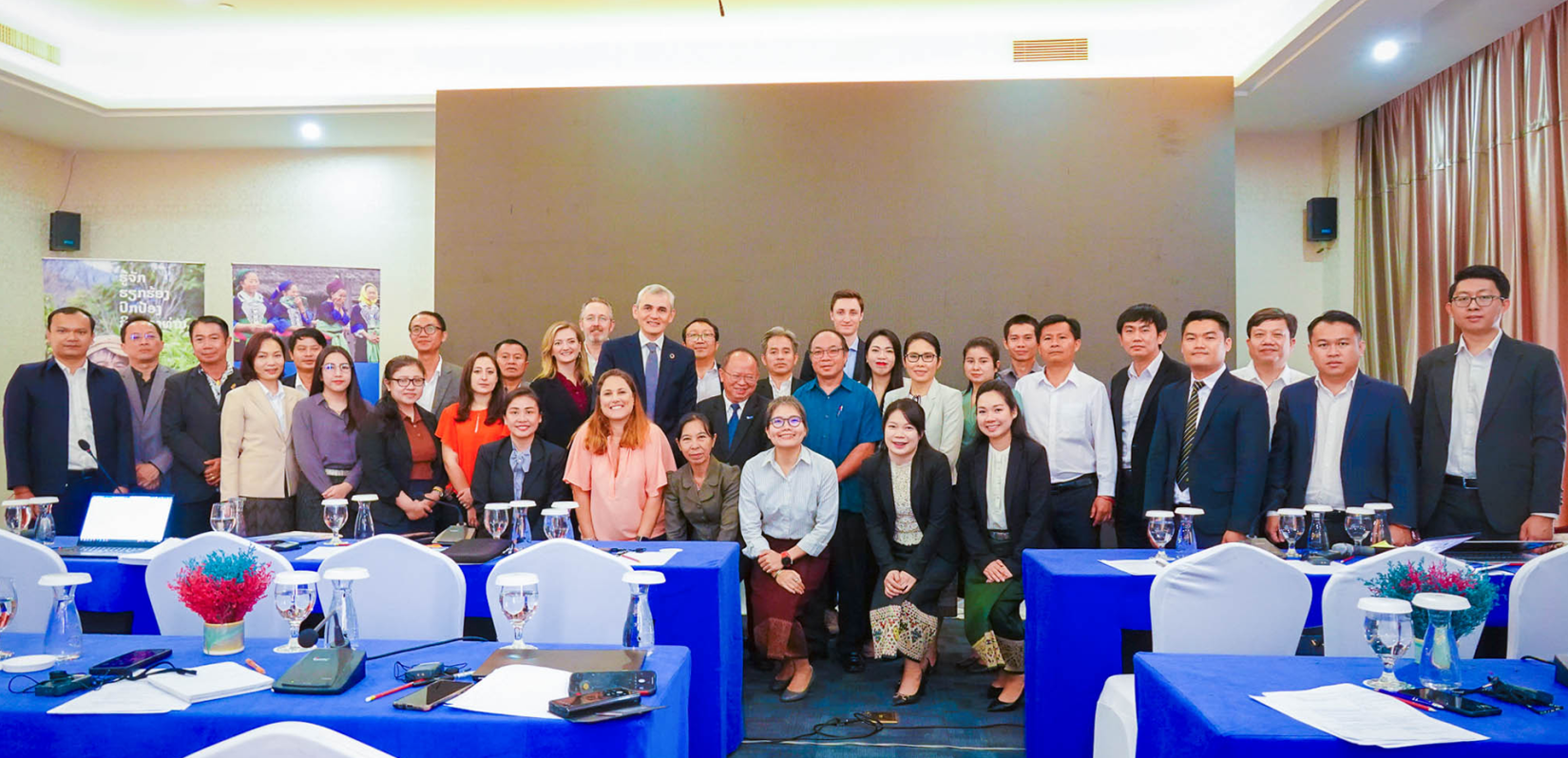ຄຳປາໄສ
Opening Remarks at Capacity-Building Workshop on the Right to a Clean, Healthy, and Sustainable Environment
18 ຕຸລາ 2023
Opening Remarks at Capacity-Building Workshop on the Right to a Clean, Healthy, and Sustainable Environment
Wednesday, 18 October 2023, 9:00am
Landmark Hotel

Dear co-chair, H.E. Amb. Phoukhong Sisoulath, Director-General of the Department of Treaty and Law, Ministry of Foreign Affairs
Dear Government representatives, colleagues,
Ladies and gentlemen,
- It is my pleasure to provide opening remarks for this workshop on the Right to a Clean, Healthy, and Sustainable Environment.
- Thank you to all participants for your presence here today. And my special appreciation to the organising team from OHCHR and UNEP, joining us from Bangkok to facilitate this event.
- I am very pleased that we can organise this event with a diverse group of participants, joining from key ministries across different areas, yet all connected to the environment and human rights.
- As you will know, a first discussion about the inherent relationship between climate, environment and human rights, was organised in March this year, with many of you who are present here today.
- It’s encouraging that we kept the momentum, seeing extensive participation for the start of this two-day workshop.
As colleagues facilitating the workshop will highlight, human rights and the environment are deeply intertwined:
- Human rights cannot be enjoyed without a safe, clean and healthy environment;
- And sustainable environmental governance cannot exist without the establishment of, and respect for, human rights.
- The correlation of human rights and the environment has been the focus of numerous global discussions in recent years. They culminated with the adoption of historic resolutions at the Human Rights Council, in October 2021, and at the UN General Assembly, in July 2022, recognising that a clean, healthy and sustainable environment is a human right.
- The resolutions reflect a global agreement on the links between sustainable development, protection of the environment, promotion of human wellbeing, and full enjoyment of all human rights – for present and future generations.
Ladies and gentlemen:
- As we all know, in Lao PDR nature is particularly crucial to human wellbeing, as many livelihoods are directly connected to and dependent on the environment and ecosystem services.
- Over 60% of the workforce is engaged in agriculture, and is reliant on increasingly unpredictable weather patterns to sustain themselves and their households.
- River ecosystems that are a lifeblood of communities are equally prone to being disrupted by climate change.
- Recognizing these vulnerabilities, it’s important to note that Lao PDR’s contribution to global emissions is minimal, but risk exposure from climate change is disproportionately high.
- The prevailing economic situation has not made this challenge easier. As acknowledged in the most recent RTIM, economic and financial difficulties have led the Government to “to rely on natural resource extraction as a coping mechanism” for revenue generation.
- Lao PDR is also rapidly moving towards becoming the “Battery of South-East Asia”, with over 70 dams already in operation across the country, including two – and seven more intended projects – on the Mekong River mainstream.
- Without adequate environmental safeguards, this presents a severe risk to ecosystems, biodiversity and to people’s environmental rights.
In particular:
- As millions of people downstream depend on Lao PDR’s rivers for their daily lives, it is crucial to ensure that these projects are also for their benefit, and do not jeopardize people’s relationship with nature.
- This includes ensuring that people, especially communities living in and around the area of the projects, are adequately informed, meaningfully consulted and compensated for the loss of land and livelihoods.
- We all know that the worldwide consequences of the Triple Planetary Crisis of climate change, biodiversity loss and pollution are felt most severely and by an ever-growing number of people, particularly those living in vulnerable conditions.
- We must recognise that the climate emergency, biodiversity collapse and pervasive pollution affect everyone, everywhere, but not equally.
- The most vulnerable and marginalised, including children, older persons, persons with disability, ethnic groups, people living in poverty, are often hit the hardest.
- The Triple Planetary Crisis has distinct and disproportionate impacts on women’s and girls’ rights, requiring gender-responsive solutions.
- Climate-related loss or change of livelihoods, as well as displacement and migration, increase risks of gender-based violence and harmful practices, including child marriage and trafficking.
- Economic difficulties, by negatively impacting on households’ incomes, may increase the likelihood of girls dropping out of school, and the risk of early marriages and pregnancies.
- Climate emergencies disrupt access to health services and life-saving commodities, including contraception.
- Heat worsens maternal and neonatal health outcomes, increasing the likelihood of stillbirth.
- The Triple Planetary Crisis and climate change have also impacts onto future generations as acknowledged in the Paris Agreement, and by the Special Rapporteur on the promotion and protection of human rights in the context of climate change, in his first report, which highlighted the importance of intergenerational equity to ensure the wellbeing of present and future generations.
Ladies and gentlemen:
- These are just a few examples of threats and consequences. With rapid development and environmental changes across the country, it is critical for all of us to be aware of how they relate to people’s rights.
- As Government and UN agencies cooperate for the achievement of the 9th NSEDP, it is our collective duty to include these considerations in our work. The rights-based approach can lead the way to inclusive, effective and sustainable outcomes.
- Let me conclude by wishing you all a fruitful workshop, with many thanks again to participants and facilitators for making this event possible.
- I hope we can continue these discussions in a sustained and inclusive manner to contribute and inform our development discourse.
Thank you.
ບັນດາໜ່ວຍງານ ສປຊ ທີ່ມີສ່ວນຮ່ວມໃນການລິເລີ່ມນີ້
OHCHR
Office of the United Nations High Commissioner for Human Rights
RCO
United Nations Resident Coordinator Office
UNEP
United Nations Environment Programme








